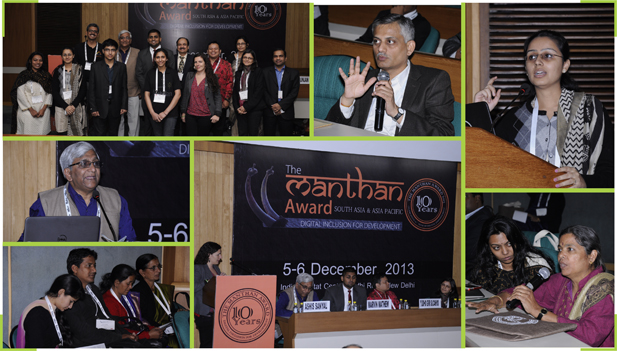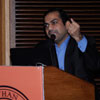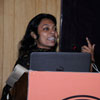Digital Solution for Education,Employment & Women Empowerment

Introduction
Focus:
- Emphasis on two primary pillars of development: Education and Women Empowerment
- Role, impact and importance of digitalization in the learning processes
- Cumulative involvement of various sectors for a comprehensive approach to progressiveness in employment
Speakers
Chair: Ashis Sanyal, e-Governance and ICT4D Consultant
Co-chair: Marvin Mathew, U.S. Ambassador, One Young World
Moderator: Sairee Chahal, Founder and CEO Applied Life Pvt. Ltd.
Jury expert: Yudho Giri, Lecturer, ICT Expert, Consultant Trainer and Researcher
Panelist: Gunjan Veda, WISH
Presenters:
- Janani Subramanian, iMOBILE Lab
- B. Ganesh, SkillTrain
- Aashish Sawhney, Let Me Know
- Snehal Lahoti, Alphabet Writing
- Mahesh Kulkarni, T-Learning Suite
- Ajay Krishnan, Cisco Inclusive Growth
- Alexandra Tyers, English and ICT for Adolescent Girls
- Mr. Amit Kumar, FightBack
- Mridula Singh & Alok Nikhil Jha, Trishulam
Summit Bytes
 Alexendra Tyers, English and ICT for Adolescent Girls, e-Women and Empowerment : English and ICT skills for rural adolescent girls in Bangladesh is an initiative by British Council and BRAC, utilizing the English software tools for teaching English to girls in rural areas. The project focusses on digital resource utilization through HTML based digital content. The content for the course is mapped to the national curriculum and processed through peer led learning. The initiative is working towards providing livelihood, sustainability, and curbing gender divide. British Council and BRAC are also heading towards establishing community based education clubs, leading to improvements in English and ICT proficiency with increased confidence, leadership and skill development.
Alexendra Tyers, English and ICT for Adolescent Girls, e-Women and Empowerment : English and ICT skills for rural adolescent girls in Bangladesh is an initiative by British Council and BRAC, utilizing the English software tools for teaching English to girls in rural areas. The project focusses on digital resource utilization through HTML based digital content. The content for the course is mapped to the national curriculum and processed through peer led learning. The initiative is working towards providing livelihood, sustainability, and curbing gender divide. British Council and BRAC are also heading towards establishing community based education clubs, leading to improvements in English and ICT proficiency with increased confidence, leadership and skill development. Amit Kumar, FightBack, e-Women and Empowerment : Today, Girls are working in late night shifts; women travel and return alone in night. Considering such situation, there has been an urgent need of a technological solution for the women empowerment, because, many a times, reaching to one specific person or trying manual reach out to the near ones does not emerge a successful solution. FightBack is a GPS based mobile application, fulfilling this technological requirement for women safety. The device is a GPS synchronized technique with Google map integration to identify the location of concern and tension. The application is programmed on gesture based alerts activation with immediate information share on Facebook wall, with family, and on the application central server. The organization has partnered with security agencies to provide immediate assistance to the victim at the place of incident.
Amit Kumar, FightBack, e-Women and Empowerment : Today, Girls are working in late night shifts; women travel and return alone in night. Considering such situation, there has been an urgent need of a technological solution for the women empowerment, because, many a times, reaching to one specific person or trying manual reach out to the near ones does not emerge a successful solution. FightBack is a GPS based mobile application, fulfilling this technological requirement for women safety. The device is a GPS synchronized technique with Google map integration to identify the location of concern and tension. The application is programmed on gesture based alerts activation with immediate information share on Facebook wall, with family, and on the application central server. The organization has partnered with security agencies to provide immediate assistance to the victim at the place of incident. Aashish Shawney, Let Me Know, e-Education, Learning and Employment : There are many opportunities where the information does not reach the potential beneficiaries – Let Me Know is an initiative towards bridging the information barrier – Connecting opportunity seekers with opportunity providers – in domain of education – integrated portal with various opportunities and information sharing on internships, scholarships, competitions, events, and young initiatives – information dissemination through emails, messages, social networking portals etc.
Aashish Shawney, Let Me Know, e-Education, Learning and Employment : There are many opportunities where the information does not reach the potential beneficiaries – Let Me Know is an initiative towards bridging the information barrier – Connecting opportunity seekers with opportunity providers – in domain of education – integrated portal with various opportunities and information sharing on internships, scholarships, competitions, events, and young initiatives – information dissemination through emails, messages, social networking portals etc. B Ganesh, SkillTrain, e-Education, Learning and Employment : SkillTrain realized a challenge in bridging the gap between the education and employment sectors in the rural areas. The project, Skill Train, has been launched with the aim of skill empowerment for people with less education and school drop-outs. Skill Train provides video based content on mobile phones for community, specifically the rural school drop-outs. The video equips the person with basic information through the animated lectures. Videos are based on basic skill development courses including Mobile Repairing, TV and Radio Repairing etc. Consequent to the video course completion, the learner can undergo a basic evaluation process. If the learner qualifies the evaluation, he/she is exposed to practical training on some minimal fees, completing which, the learner gets certificate recognition from the Govt. of India. The courses are devised such that the educators are able to derive job opportunities in the local areas only. The entire is structured considering the incapability of people to take up classroom courses and the project serves various organizations’ requirements of vocationally skilled people.
B Ganesh, SkillTrain, e-Education, Learning and Employment : SkillTrain realized a challenge in bridging the gap between the education and employment sectors in the rural areas. The project, Skill Train, has been launched with the aim of skill empowerment for people with less education and school drop-outs. Skill Train provides video based content on mobile phones for community, specifically the rural school drop-outs. The video equips the person with basic information through the animated lectures. Videos are based on basic skill development courses including Mobile Repairing, TV and Radio Repairing etc. Consequent to the video course completion, the learner can undergo a basic evaluation process. If the learner qualifies the evaluation, he/she is exposed to practical training on some minimal fees, completing which, the learner gets certificate recognition from the Govt. of India. The courses are devised such that the educators are able to derive job opportunities in the local areas only. The entire is structured considering the incapability of people to take up classroom courses and the project serves various organizations’ requirements of vocationally skilled people. Janani Subramanian, iMOBILE Lab, e-Education, Learning and Employment : There is an urgent concern on the lack of science and computer labs, probable lack of good science and computer teachers in schools and/or lack of electricity in schools for practical trainings. iMOBILE Initiative has been taken by Agastya foundation to collect all the resources such as computers, UPS, Content books in a van that goes to multiple schools, based on a rotation policy for education empowerment. The project provides hands on experience to students on various computing and scientific concepts and experiments, followed by simple tutorial. The content is created in local languages and maximum teaching is done through Google images. Moreover, internet applications are developed such that if students are interested to learn more, access more information, students can access the application – even in the absence of the teachers – cost effective, contextualized initiative for educational developments in grassroots.
Janani Subramanian, iMOBILE Lab, e-Education, Learning and Employment : There is an urgent concern on the lack of science and computer labs, probable lack of good science and computer teachers in schools and/or lack of electricity in schools for practical trainings. iMOBILE Initiative has been taken by Agastya foundation to collect all the resources such as computers, UPS, Content books in a van that goes to multiple schools, based on a rotation policy for education empowerment. The project provides hands on experience to students on various computing and scientific concepts and experiments, followed by simple tutorial. The content is created in local languages and maximum teaching is done through Google images. Moreover, internet applications are developed such that if students are interested to learn more, access more information, students can access the application – even in the absence of the teachers – cost effective, contextualized initiative for educational developments in grassroots. Mahesh Kulkarni, T Learning Suite, e-Education, Learning and Employment : A technology for education based broadcasters enabling them with interactive learning methods and resources. The framework is entirely language independent, and facilitates the content producers to manufacture the T-Content, transforming television into a “Virtual University”. Currently supporting 22 Indian languages, the technology reaches the grassroots, thereby enabling education penetration at the basic level. The project aspire associations with educational DTH service providers, commercial broadcasters, and NPTEL integrations for an increased outreach and impact. The organization is also focused upon moving to other sectors of t-health, t-governance and t-commerce as part of the initiative, empowering the overall development.
Mahesh Kulkarni, T Learning Suite, e-Education, Learning and Employment : A technology for education based broadcasters enabling them with interactive learning methods and resources. The framework is entirely language independent, and facilitates the content producers to manufacture the T-Content, transforming television into a “Virtual University”. Currently supporting 22 Indian languages, the technology reaches the grassroots, thereby enabling education penetration at the basic level. The project aspire associations with educational DTH service providers, commercial broadcasters, and NPTEL integrations for an increased outreach and impact. The organization is also focused upon moving to other sectors of t-health, t-governance and t-commerce as part of the initiative, empowering the overall development. Mridula Singh and Alok Nikhil Jha, Trishulam, e-Women and Empowerment : Trishulam is an initiative towards women safety and empowerment through a mobile based application. The application has three modes with the panic/danger mode being third mode. As this particular mode gets activated, the mobile camera automatically gets active, the microphone initiates, the GPS gets started and the tower location is mapped. All these relevant information are synchronized with the server, and the emergency contact of the victim would be able to see the situation. The information can be accessed offline without any specific requirement of an application or a smartphone. The application can also create a tree of security points for the user as per the current location, and updates a real time social network of the security locations in the nearby areas.
Mridula Singh and Alok Nikhil Jha, Trishulam, e-Women and Empowerment : Trishulam is an initiative towards women safety and empowerment through a mobile based application. The application has three modes with the panic/danger mode being third mode. As this particular mode gets activated, the mobile camera automatically gets active, the microphone initiates, the GPS gets started and the tower location is mapped. All these relevant information are synchronized with the server, and the emergency contact of the victim would be able to see the situation. The information can be accessed offline without any specific requirement of an application or a smartphone. The application can also create a tree of security points for the user as per the current location, and updates a real time social network of the security locations in the nearby areas. Sneha Lahoti, Alphabet Writing, e-Education, Learning and Employment : Alphabet Writing is a mobile application that provides an easy way to learn alphabet writing in various languages. The application uses animated software techniques and alphabet voice overs to assist in learning. As the application is devised specifically for kids, Mango Technologies have also incorporated many fun elements in the application. The technique also identifies the errors, and advises on its correctness. Once the alphabet is correctly drawn, the application displays the corresponding objects to that alphabet for better understanding. The application is also visioning towards integrating other international languages, providing scoring and feedback, along with worksheets and assignments.
Sneha Lahoti, Alphabet Writing, e-Education, Learning and Employment : Alphabet Writing is a mobile application that provides an easy way to learn alphabet writing in various languages. The application uses animated software techniques and alphabet voice overs to assist in learning. As the application is devised specifically for kids, Mango Technologies have also incorporated many fun elements in the application. The technique also identifies the errors, and advises on its correctness. Once the alphabet is correctly drawn, the application displays the corresponding objects to that alphabet for better understanding. The application is also visioning towards integrating other international languages, providing scoring and feedback, along with worksheets and assignments. Ajay Krishnan(Inclusive Growth Group, Bangalore) :11000 Engineers of Cisco System in collaboration with Inclusive Growth Group have developed solutions to developed India using Digital Technology where they have discovered that there will be 3 billion digital users and those will be from India and China alone. So, they have started with the goal of customizing technology for the developing world in the three areas namely Education, Skills Development and Health Care. Primary goal of the solutions should be extremely cost effective, replicable, modular and scalable. Challenges lies in technology work in consistent and sustainable basis in a cost effective manner. For Example schools like Sarba Shiksha Abhiyan in remote corner of Shimoga District of Karnataka have 6 Computers present in the School. Out of which 5 Computers are not in service. So, they use the single Computer to teach the entire class, where they used to teach students on certain topics like using of rocket but there is a huge gap between the teacher and the student as the teacher in not able to reach to the student in proper manner.
Ajay Krishnan(Inclusive Growth Group, Bangalore) :11000 Engineers of Cisco System in collaboration with Inclusive Growth Group have developed solutions to developed India using Digital Technology where they have discovered that there will be 3 billion digital users and those will be from India and China alone. So, they have started with the goal of customizing technology for the developing world in the three areas namely Education, Skills Development and Health Care. Primary goal of the solutions should be extremely cost effective, replicable, modular and scalable. Challenges lies in technology work in consistent and sustainable basis in a cost effective manner. For Example schools like Sarba Shiksha Abhiyan in remote corner of Shimoga District of Karnataka have 6 Computers present in the School. Out of which 5 Computers are not in service. So, they use the single Computer to teach the entire class, where they used to teach students on certain topics like using of rocket but there is a huge gap between the teacher and the student as the teacher in not able to reach to the student in proper manner.To minimize the gap between the teacher and the student the Inclusive Growth Group introduced the concept of Edu Chat which comprises of studio where a teacher from specific location use to interact with all the students through remote classroom concept.With the use of it the students could understand the topics clearly but if they wanted to question back they have to do it through text messages or phone calls which is again not very effective as the kid losses the interest very soon. Finally they introduced cloud computing to bridge the gap between the teacher and the kid. And the Remote teacher can get into the classroom from the far end. With this they have completed 600 hours of computer teaching in remote parts of Karnataka and 25000 hours of teaching in Kerela. With led to the skill development they worked closely with the Nurses Training Programme in Bihar where content of the nurses is given by the Partner which is a world leader in Nursing Education who use to developed, deploy, train the teachers and monitor and they are also responsible for the software . And the Cisco System in collaboration with Inclusive Growth Group in the hardware in the platform piece.In 34 locations in Kerala they have also expanded in Fashion Technology Skill, Motor Usage Technology Skill and these contracts with the completed of its successful first year it got renewed for the 2nd year. Skill partners for Pune have Maliyali Skill Trainers teaching in Soft Skills to students . And that is how they have developed a noticeable change in their Skill Development Programmes. The key of technology have taken care end to end by using Cisco Education Enabled Platform (CEEP) which contains Industrial Grad Devices kept in the top of the classroom in the ceiling which has a router, computer, projector built-in, cameras are connected to it, mike on the sides, mike for the students, speakers on the side, digital pad in the remote classroom. In India their presence in over 160 locations out of which some are free pilots but most are paid pilots.
Panel Encouragements and Recommendations
- There is a great digital divide on part of women participation and efforts should be put in to involve women, not only in the traditional areas, but also in the non – conventional domains.
- More initiatives should be looked in for in the domain of education and women empowerment, inspired by the necessity, and driven by technological solutions
- India is a country with great number of engineers. Solutions should be focused with a strong engineering foundation, thereby aptly utilising the enormous skill reservoir.
